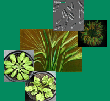| Mustroph, A: Improving Flooding Tolerance of Crop Plants, Agronomy, MDPI, 8(9), 160 (2018), doi:10.3390/agronomy8090160 | |
| Abstract: A major problem of climate change is the increasing duration and frequency of heavy rainfall events. This leads to soil flooding that negatively affects plant growth, eventually leading to death of plants if the flooding persists for several days. Most crop plants are very sensitive to flooding, and dramatic yield losses occur due to flooding each year. This review summarizes recent progress and approaches to enhance crop resistance to flooding. Most experiments have been done on maize, barley, and soybean. Work on other crops such as wheat and rape has only started. The most promising traits that might enhance crop flooding tolerance are anatomical adaptations such as aerenchyma formation, the formation of a barrier against radial oxygen loss, and the growth of adventitious roots. Metabolic adaptations might be able to improve waterlogging tolerance as well, but more studies are needed in this direction. Reasonable approaches for future studies are quantitative trait locus (QTL) analyses or genome-wide association (GWA) studies in combination with specific tolerance traits that can be easily assessed. The usage of flooding-tolerant relatives or ancestral cultivars of the crop of interest in these experiments might enhance the chances of finding useful tolerance traits to be used in breeding. |

Letzte Änderung 01.06.2021

